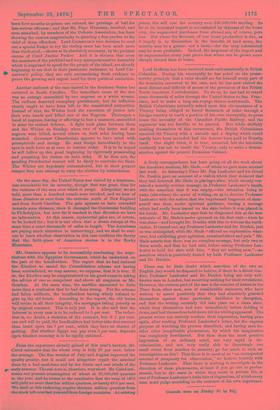There can be little doubt which assertion of the two
an English jury would be disposed to believe, if there be a direct con- flict, Professor Lankester and Dr. Donkin being not only well- known men in London, but receiving nothing for their revelationi. However, the curious part of the case is the number of letters in the Times from other men, men of considerable eminence, who have written to assert positively that they had absolutely guarded themselves against these particular liabilities to deception, and that the writing certainly did take place on a clean slate, which they themselves had seen immediately before holding it slown, and had themselves held down till the writing appeared. The present writer can entirely confirm their impression, having gone again, after reading Professor Lankester's letter, for the express purpose of watching the process described; and having seen be- sides other inexplicable phenomena, by which his imagination was completely bewildered. But then does the most positive impression of an ordinary mind, not very rapid in dis- crimination, and not very easily able to disentangle one small event from another in memory, go for much in such an investigation as this? That there is in most of us "an unsuspected amount of incapacity for observation," we believe heartily with Professor Lankester. That there is nothing to investigate in the direction of these phenomena, at least if •you go not to profes- sionals, but to the cases in which they wear in private life, is one of Professor I..ankester's little bits of dogmatiam, of which every man must judge according to the contents of his own experience.






























 Previous page
Previous page